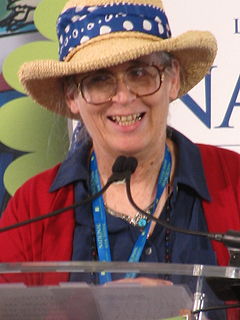A Quote by Elizabeth Moon
My personal feeling about science fiction is that it's always in some way connected to the real world, to our everyday world.
Related Quotes
I guess...on one hand, I spent way too much time watching science fiction and reading science fiction when I was growing up. But a part of it is I also never felt much of a connection to the world in which I lived while I was growing up, and so, oddly enough, I think I felt a lot more connected to the worlds that I read about in science fiction.
The future is unwritten. there are best case scenarios. There are worst-case scenarios. both of them are great fun to write about if you' re a science fiction novelist, but neither of them ever happens in the real world. What happens in the real world is always a sideways-case scenario. World-changing marvels to us, are only wallpaper to our children.
Science fiction is the most important literature in the history of the world, because it's the history of ideas, the history of our civilization birthing itself. ...Science fiction is central to everything we've ever done, and people who make fun of science fiction writers don't know what they're talking about.
Science fiction is a weird category, because it's the only area of fiction I can think of where the story is not of primary importance. Science fiction tends to be more about the science, or the invention of the fantasy world, or the political allegory. When I left science fiction, I said "They're more interested in planets, and I'm interested in people."
I define science fiction as the art of the possible. Fantasy is the art of the impossible. Science fiction, again, is the history of ideas, and they're always ideas that work themselves out and become real and happen in the world. And fantasy comes along and says, 'We're going to break all the laws of physics.' ... Most people don't realize it, but the series of films which have made more money than any other series of films in the history of the universe is the James Bond series. They're all science fiction, too - romantic, adventurous, frivolous, fantastic science fiction!
Literary science fiction is a very, very narrow band of the publishing business. I love science fiction in more of a pop-culture sense. And by the way, the line between science fiction and reality has blurred a lot in my life doing deep ocean expeditions and working on actual space projects and so on. So I tend to be more fascinated by the reality of the science-fiction world in which we live.
I agree that science is the best way of understanding the natural world, and therefore that we have reason to believe what the best science tells us about the objects in that world and the relations between them. But this does not mean that the natural world is the only thing we can have true beliefs about. The status of material objects as things that are "real" is a matter of their having physical properties, such as weight, solidity, and spatio-temporal location. In order to be real, such things need not have, in addition to these properties, some further kind of metaphysical existence.

































